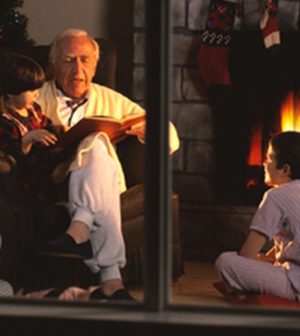- 8 Ways to Increase Dopamine Naturally
- 7 Best Breads for Maintaining Stable Blood Sugar
- Gelatin vs. Collagen: Which is Best for Skin, Nails, and Joints?
- The Long-Term Effects of Daily Turmeric Supplements on Liver Health
- Could Your Grocery Store Meat Be Causing Recurring UTIs?
- Are You Making This Expensive Thermostat Error This Winter?
- Recognizing the Signs of Hypothyroidism
- 10 Strategies to Overcome Insomnia
- Could Artificial Sweeteners Be Aging the Brain Faster?
- Techniques for Soothing Your Nervous System
Make the Holidays Comforting for Loved Ones With Alzheimer’s

Those who have dementia can find the holiday season disorienting, but their loved ones can help.
“The holiday season can be both joyful and stressful for all of us, especially individuals living with a dementia-related illness,” said Jennifer Reeder, director of educational and social services for the Alzheimer’s Foundation of America (AFA).
“Being proactive, adaptable and inclusive of the person’s wishes and abilities are the best ways to help them have a happy and joyful holiday season,” she said in a foundation news release.
Start by realizing less is more when it comes to decorating. AFA experts suggest simple decorations to keep from overstimulating the loved one with dementia. Too many flickering lights or noisy items can be overwhelming. Instead, choose a few favorite items.
Phase in decorations over a period of days instead of all at once, the foundation suggests. That will keep the changes to a person’s environment less confusing.
Keep the space safe by not using decorations that are fragile and could shatter, or that could be confused with edible treats. Be mindful of potential tripping hazards on the floor, such as wires for decorations.
Christmas trees should be hooked to the wall. Instead of real candles, use electric or battery options to reduce the risk of fire.
Try to maintain routines through the season. Create a comfortable space where guests can continue their visits with your loved one, the foundation suggests.
While building on old traditions that still feel right, adapt holiday celebrating to suit your loved one’s new needs. Some ideas include enjoying music and movies together or looking at photos of past holiday celebrations.
Whenever possible, involve your loved one by asking what traditions are important to them. If they always sent out holiday cards or baked holiday cookies and still want to do so, do it together with them. If they can no longer shop for gifts for their loved ones, include them by inviting them to help wrap the gifts.
Touring neighborhood holiday lights may be something your loved one can enjoy and do.
The foundation suggests taking a strength-based and person-centered approach to choosing activities and finding joy now, rather than dwelling on what they used to do.
The AFA offers a helpline seven days a week to answer caregiving questions at 866-232-8484 to talk with a social worker. You can visit alzfdn.org for a web chat or text 646-586-5283 to talk by text message.
More information
The U.S. National Institute on Aging has tips on home safety for those with Alzheimer’s disease.
SOURCE: Alzheimer’s Foundation of America, news release, Dec. 9, 2022
Source: HealthDay
Copyright © 2026 HealthDay. All rights reserved.










